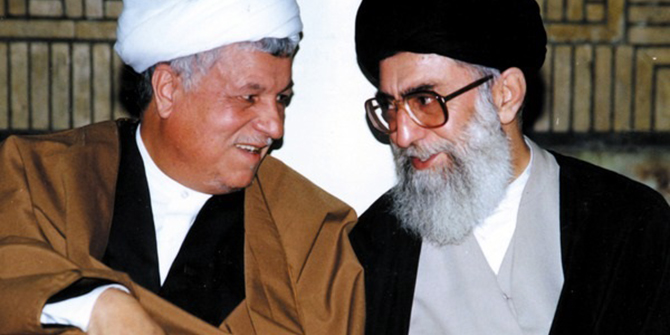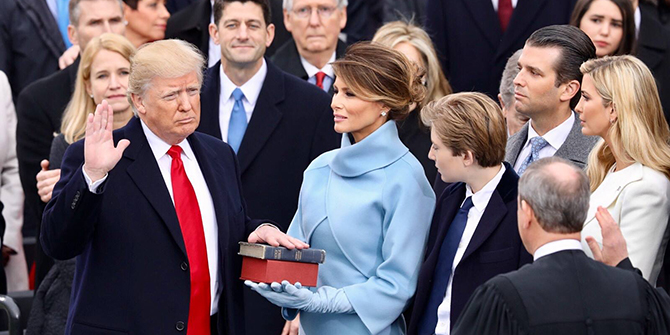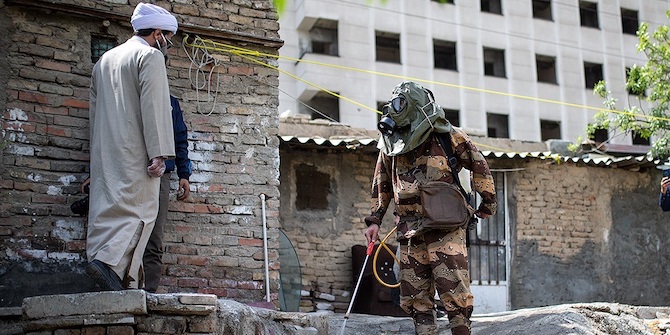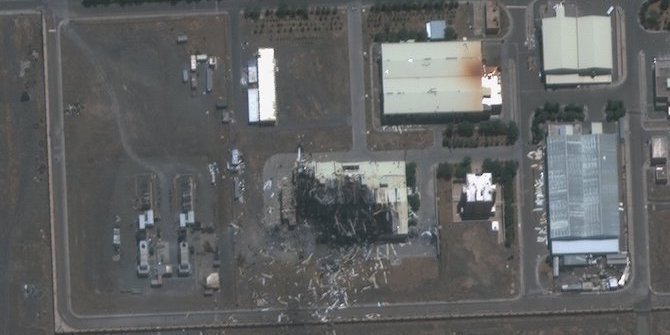by Madawi Al-Rasheed
This memo was presented part of a workshop organised by the LSE Middle East Centre looking at the Saudi–Iran rivalry in the region on 7 May 2018.
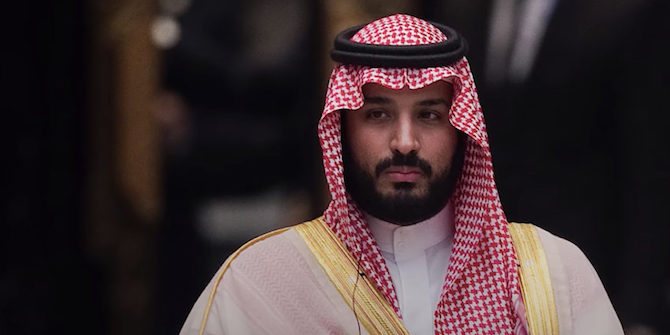
Most analysis of the Saudi–Iranian rivalry seems to miss the fundamental points that underline the tension. Both countries are not trying to defend themselves from each other. Iran is trying to save itself from either foreign intervention or domestic unrest. While Saudi Arabia does not fear foreign intervention, it is concerned with domestic dissent.
Arguably, Crown Prince Mohammed bin Salman is determined to perpetuate four decades of rivalry and conflict with Iran. Although throughout the twentieth century the relationship between the two countries oscillated between indifference, hostility, rapprochement and tension, since he became the new face of Saudi Arabia in 2015, he has raised Riyadh’s concerns over Iranian expansion in the Arab world and beyond. He seeks to continue his country’s enmity with Iran and privilege the perpetuation of the conflict rather than seek rapprochement. The prince has used the rivalry with Tehran to deflect from the complexity of his own domestic uncertainties.
During the early years that followed the Iranian revolution of 1979, Iran wanted to export its own revolution and adopted anti-monarchical rhetoric. This led to inaugurating a troubled relationship with Saudi Arabia, leading to moments of serious tension. As Iran became an Islamic republic, Saudi Arabia was threatened by the high expectations of its own Islamists, who must have been inspired by the Iranian success and intensified their activism to establish their own version of the Islamic state. Riyadh embarked on a project to spread its Wahhabi version of Islam, and its clerics increased the frequency of their anti-Shi’a theology. Iran, on the other hand, downplayed its Shi’ism in an attempt to appeal to Muslims worldwide and augmented its anti-monarchical and anti-Western rhetoric. Saudi Arabia felt threatened by the rise of Iran in this specific way.
While not underestimating Saudi regional ambitions that underpin the most recent episode of the troubled and volatile Saudi–Iranian relations, to understand the current roots of antagonism we need not go beyond Saudi domestic uncertainties. These are different from those that in the past had fuelled the conflict.
Today, Mohammad bin Salman needs to keep Iran isolated to deflate the uncertainties he faces, not all of them are related to the prospect of radical Saudi Islamist violence such as the kind that ravaged Syria and Iraq. Previous Kings, Khalid (1975–1982), Fahd (1982–2005), and Abdullah (2005–2015) faced different domestic challenges that the rivalry with Iran helped to deflate but today there are new sets of uncertainties that Mohammad bin Salman is currently unable to resolve to his own advantage. Consequently, these challenges contribute a great deal to perpetuating a rivalry that has become extremely destabilising across the region from Sana’a to Damascus, Beirut and Baghdad.
The first and most important challenge facing the crown prince is consolidating his own rule and centralising major policy decisions under his umbrella, thus excluding a whole range of other aspiring princes. From swift dismissals (eg. sacking Crown Prince and Minister of Interior Muhammad ben Nayif and Commander of the Saudi National Guard Mitab ben Abdullah), to the detention of wealthy princes (such as Walid bin Talal in an allegedly anti-corruption campaign), Mohammed bin Salman feels restless. The unprecedented marginalisation and even humiliation of senior princes still haunt not only the young prince but also a large pool of disgruntled brothers and cousins. It is uncertain what the outcome of such drastic and unprecedented measures would be in the long term. With quick repression and bans on travel even among princes, the crown prince precipitated a volatile, albeit silent, revolt among his own kin. This revolt does not dare to surface and almost all royal contenders have remained quiet since he became crown prince. While there are a couple of royal voices challenging Mohammed bin Salman from abroad, they are marginal and insignificant. Yet they reflect the level of discontent among those who had been wealthy and powerful but have now sunk into historical oblivion.
The regime, however, has never admitted to facing any domestic threats. Instead, it has always insisted that external threats are the only danger facing the kingdom. When then-US President Barack Obama highlighted that both Saudi Arabia and other Gulf countries face challenging youth aspirations towards greater openness, justice, and employment, Prince Turki al-Faisal, retired ambassador to the US and ex-director of intelligence services, quickly reminded him of Iran, and considered it as the only destabilising force in the Arab world.
The prince’s strong anti-Iranian rhetoric and multiple promises to roll back Iranian influence in Bahrain, Yemen, Lebanon, Syria and Iraq, where it had so obviously been proliferating by the time he became crown prince in 2016, are meant to create a war-like situation in which internal dissent is silenced. Under the threat of Iran, his domestic policies have become sacrosanct. Criticism of his controversial anti-corruption campaign, Vision 2030, muzzling the religious establishment, and introducing cosmetic yet spectacular social reforms are hailed as great top-down revolution promising a cataclysmic transformation. Those who dare challenge this narrative are accused of treason and loyalty to foreign governments. Several activists have been detained simply for being outspoken and critical of his recent social and economic plans.
The regime wants to remind both marginalised princes and Saudis that the young prince is fighting an existential threat, represented by the hawkish Iranians. By amplifying the Iranian threat and magnifying his own Arab mission to save the region from Persianisation and shi’ification, Mohammed bin Salman blames Iran for any dissent in the country. This applies not only to the Shi’a protest movement in the Eastern province, but also Sunni dissident especially that emerged during the 2011 Arab Uprisings. He frightens the Sunni majority with the threat of an Iranian backed conspiracy to destabilise the kingdom, create a Shi’a enclave in the oil rich province, and eventually partition Saudi Arabia along regional and sectarian lines.
Second, amplifying the Iranian danger and perpetuating enmity with Tehran is a prerequisite for the domestic ideological shift that Mohammed bin Salman under the auspices of his father King Salman has instigated since 2015. King Salman adopted the title malik al-hazm, king of steadfastness, in contrast with the soft face of King Abdullah, who became known as the King of Humanity before he died in 2015. Although old King Salman adopted a symbolic aggressive title, it was his son Mohammed who was entrusted with the mission to show masculine steadfastness, nowhere but in Yemen where Saudi militarised nationalism was to be tested against the Houthis, dubbed as Iranian clients. Under King Salman, his son started playing down the old Wahhabi religious nationalism, the ideological glue that had bound Saudis together under the umbrella of religious zeal, authenticity and moral high ground.
With the Saudi Wahhabi legitimacy narrative subsiding and even gradually being denied and supressed, the Saudi leadership adopted a populist Saudi militarised nationalism, whose main target is Iran with its alleged aggressive Persian counter nationalism. The Saudi war in Yemen was perceived as a necessary response to an existential threat, and a battle for survival for the Saudi nation. Rivalry with Iran keeps the momentum of the emerging Saudi populist nationalism. It strengthens the abstract sense of Saudi national solidarity. Continuing a proxy war with Iran even without a decisive victory in Yemen remains important for domestic reasons. Saudi Arabia is yet to find a diplomatic solution to a conflict that proved to be difficult to win.
Thirdly, the economic supremacy of Saudi Arabia is inevitably still dependent on the country maintaining its historical share in the global oil market and its position as an investment destination for global capital in the region. Keeping a large oil-producing country and a huge market with a great potential under international pressure remain so important to Saudi Arabia. Saudi Arabia sees the Iranian economy through the lens of competition rather than regional integration. It seeks the shrinking – or even the collapse – of the Iranian economy under sanctions and has never engaged in a bid to create regional integration in which Iranian human resources and products become readily integrated in a wider Gulf regional initiative. In retaliation, in 2016, the Iranians have used cyber warfare against Saudi ARAMCO, the oil company, to undermine the Saudi oil economy especially after Saudi Arabia refused to lower its oil production in 2014, a move that resulted in even lower oil prices. Saudi economic development plans and current Vision 2030 exclude the potential of Iran while it seeks greater regional integration with the UAE, Jordan, Egypt and possibly Israel.
Finally, perpetuating enmity with Iran is extremely important for Saudi Arabia’s relation with the West. Any rapprochement between the West and Iran – such as the one that led to the 2015 Iran Nuclear Agreement – is perceived with suspicion and fear. Saudi Arabia needs to be the only US client, not only in the Arabian Peninsula but also in the region and beyond. Saudi Arabia will not accept a return to the status quo ante of the Cold War when Iran provided the military base and Saudi Arabia provided Islamic ammunition against the Soviet Union. The pre-1979 division of labour between the Saudis and the Iranians cannot be reproduced now, given that Saudi Arabia had sought to strengthen its own military capabilities and present itself as the only viable regional alternative power to Iran.
Conflict with Iran contributes above all to Saudi Arabia maintaining its position as an Arab regional force, loyal to the US and willing to pursue policies and strategies favourable to US national interests. Saudi Arabia’s worse nightmare is for the US to contemplate normalisation of relations with Iran, albeit unlikely under President Donald Trump, or even diversify the countries the US can rely on as regional partners in the Persian Gulf.
While Mohammed bin Salman cannot expect US–Israeli relations to worsen more than they did under the Obama administration, he fears most a US rapprochement with Iran. Since 2015, Mohammed bin Salman has stepped up his demonisation of Iran during his several visits to the US. He held it responsible for radicalisation in Saudi Arabia, global terrorism and the rise of the Islamic State (ISIS) in areas where Iranian influence and Shi’a ascendance had led to the marginalisation of the Sunni population such as in Iraq, Syria and Lebanon. On several occasions, he reminded American audiences that Al-Qaida affiliates and relatives of Osama bin Laden took refuge in Iran. More recently, he held Iran responsible for creating violent sectarian militias that terrorise Sunni populations under the guise of fighting terrorism in Iraq and Syria. He referred to Supreme Leader Ayatollah Ali Khamenei as the new Hitler, thus striking a chord among US and Western audiences.
The hostile relationship between the two countries will improve only if the domestic uncertainties subside or fade away. This can be accomplished with Saudi Arabia resolving its domestic challenges with a representative government whose national interest overrides the erratic and grandiose projects of a single autocratic leadership who sees in the perpetuation of the conflict an opportunity to establish legitimacy and eventually emerge as not only the undisputed ruler of Saudi Arabia but also the main arbiter of the affairs of the Arab world as a whole.

Madawi Al-Rasheed is Visiting Professor at the LSE Middle East Centre. Previously, she was Research Fellow at the Open Society Foundation. Between 1994–2013, she was Professor of Anthropology of Religion at King’s College London. She tweets at @MadawiDr.
Other posts in this Series:
- The Iranian Threat: The Saudi Perspective by Ali Shihabi
- Saudi Arabia and Iran: Mirrored Islamisms by John Jenkins
- Saudi Arabia, Iran and the Struggle for Supremacy in Lebanon and Bahrain by Simon Mabon
- Yemen: Background to the Manufacture of a Proxy War by Helen Lackner
- Saudi–Iranian Rivalry and the Impact on the Syrian Conflict by Julien Barnes-Dacey
- Weathering the Storm: Europe’s Iran Policy after America’s Withdrawal from the Nuclear Deal by Riccardo Alcaro
- Balancing Act: Russia between Iran and Saudi Arabia by Mark N. Katz
- Conceptual Origins of Iranian-Saudi Entanglements by Mahmood Sariolghalam



